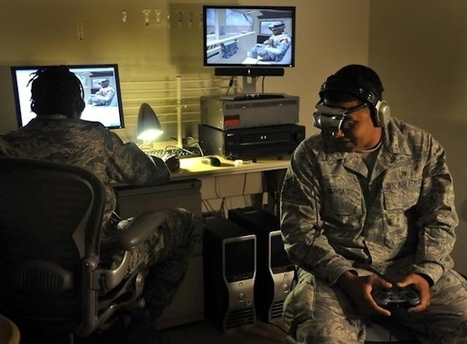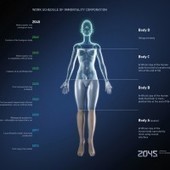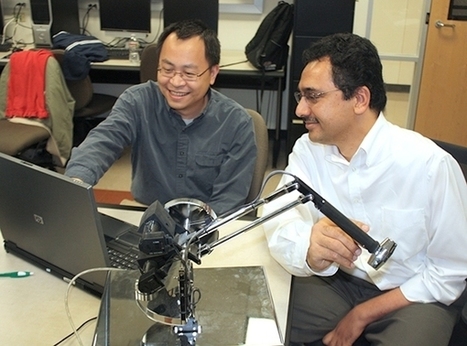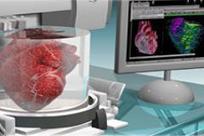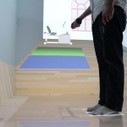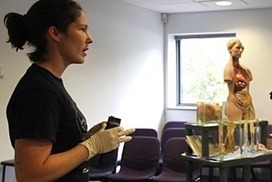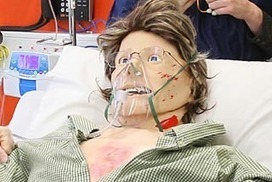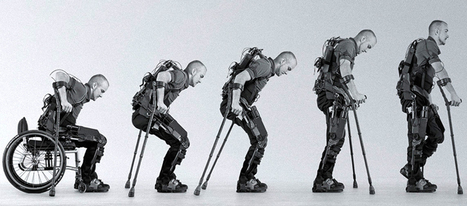 Your new post is loading...
 Your new post is loading...

|
Scooped by
Kim Flintoff
April 17, 2013 11:44 PM
|
Live April 24, 2013 2p PT - Tom Levenson - filmmaker and Prof of Science Writing at MIT - hosts Maryn McKenna. The topic is looming antibiotic disaster. Journalist and author Maryn McKenna specializes in public health, global health and food policy. "Scary Disease Girl' is the author of Superbug: The Fatal Menace of MRSA and Beating Back the Devil: On the Front Lines with the Disease Detectives of the Epidemic Intelligence Service.

|
Scooped by
Peter Mellow
April 10, 2013 12:35 AM
|
IBM's Watson—the same machine that beat Ken Jennings at Jeopardy—is now churning through case histories at Memorial Sloan-Kettering, learning to make diagnoses and treatment recommendations.

|
Scooped by
Kim Flintoff
April 4, 2013 11:49 AM
|
[From Time] [Image: The U.S. military is already using virtual-reality therapy to help troops suffering from post-traumatic stress disorder. Air Force photo / Senior Airman Renae Kleckner] Embracin...

|
Scooped by
Kim Flintoff
March 29, 2013 5:52 PM
|
Russian media tycoon Dmitry Itskov wants to save humanity from guaranteed destruction by creating human cyborgs. Now, I know what you might be thinking: How are we taking any of this seriously? Neo-humanism? Cyborgs? Holographic bodies? We can’t even make a smartphone that doesn’t run out of juice after a few hours of heavy use, and we’re talking about putting human consciousness into a machine?
The short answer is, yes. In fact, many of these technologies are further along than you might think. Scientists have successfully enabled monkeys to control robotic arms just by thinking. The U.S. military is toying with soldiers fighting wars with avatar robot soldiers. And we long ago figured out how to isolate a brain from the body, Itskov points out. Is it really so crazy to think that, after a few more decades of dedicated research, we can achieve something close to Itskov’s goal?

|
Scooped by
Peter Mellow
March 27, 2013 6:38 PM
|
Telepresence and simulation technologies offer remote learners the real thing in training for patient care.

|
Scooped by
Peter Mellow
March 13, 2013 8:32 PM
|
Scientists in Tanzania turned an iPhone into an amateur microscope to check schoolchildren for intestinal worms.

|
Rescooped by
Peter Mellow
from E learning social media +
March 11, 2013 8:58 PM
|
This is a presentation that I gave yesterday at a Cardiff University conference on Technology-Enhanced Education. You can see the Twitter stream here. It is about my experiences trying to use free social media tools with Blackboard. These are simple tools that any one could use and many of the people who read this blog will be very familiar with them. But I hope you might find it interesting.
Via Josephine Boland

|
Scooped by
Kim Flintoff
March 8, 2013 10:36 PM
|
It’s the experience of sensory overload, according to a new game called Auti-Sim. The simulation, created by a three-member team at the Vancouver Hacking Health hackathon, aims to raise awareness of the challenges of hypersensitivity disorder and help people understand how it can lead to isolation.

|
Scooped by
Peter Mellow
March 3, 2013 11:11 PM
|
Computer games and home-based self-help should be considered as part of healthcare in Australia, according to those shaping its future.

|
Scooped by
Kim Flintoff
February 6, 2013 7:05 PM
|
UT Dallas researchers are extending the borders of virtual reality, going beyond virtual spaces in which people can see and hear one another to an environment that adds the sense of touch. The technology would make it possible for physical therapists, for example, to work with patients in other locations. When a patient pushes down on a device, a doctor’s device in another location would also move down with the same force, as if the patient were physically pressing the doctor’s hand.

|
Scooped by
Kim Flintoff
January 31, 2013 8:22 PM
|
The study, conducted by clinical psychologist Robin Rosenberg and colleagues from Stanford University’s Virtual Human Interaction Lab, not only reinforced common superhero tropes, but also showed how using virtual reality experiences can increase pro-social behavior in the physical world, an area researchers say holds vast potential. Jeremy Bailenson, associate professor of communication at Stanford University and founder of the Virtual Human Interaction Lab, says for years he and his colleagues have run virtual reality experiments with a the following assumption always taken as a given: experiences in VR are profound.

|
Scooped by
Kim Flintoff
January 25, 2013 12:33 AM
|
Printing off a kidney or another human organ may sound like something out of science fiction, but with advancements in 3D printing technology, the idea may not be so far-fetched.

|
Scooped by
Kim Flintoff
January 23, 2013 8:36 PM
|
'Bioprinting' aims to make new body parts in minutes
|

|
Scooped by
Kim Flintoff
April 16, 2013 10:18 AM
|
Legacy of Aviation Safety Pioneer Inspires Application of Flight Simulation Principles to MedicineEarly Stage Prototype Simulator Presented to French Prime Minister NEW YORK, April 11, 2013 /PRNewswire-USNewswire/ -- Research scientists from the...

|
Scooped by
Peter Mellow
April 10, 2013 12:33 AM
|
Health communication systems designed for rural, developing countries -- where hospitals are often understaffed and transportation is inadequate -- are being adapted to improve care in U.S. cities.

|
Scooped by
Peter Mellow
April 2, 2013 6:14 PM
|
Game-changing research by Kiwi scientists - producing world-first 3D models - will help doctors better recognise and treat potentially fatal heart problems.

|
Scooped by
Kim Flintoff
March 28, 2013 1:44 PM
|
But a WID team says it has developed, for the first time, a way to move virtual objects in an immersive virtual reality environment through the use of muscle activity. In addition to making virtual reality more interactive and realistic, the research could have rehabilitation applications for people recovering from injuries or people living with specific disabilities.

|
Scooped by
Peter Mellow
March 13, 2013 9:14 PM
|
TEENAGE giggles and lively classroom chatter spilt into the hallway at University of NSW's museum of human disease.

|
Scooped by
Peter Mellow
March 12, 2013 5:59 PM
|
Advocates of remote health monitoring point to lessened strain on hospitals - but recent studies suggest it is not all good news.

|
Rescooped by
Peter Mellow
from E learning social media +
March 11, 2013 8:56 PM
|
Mike Cadogan, MD
Emergency Medicine Physician and
Social Media and Medical Informatics Consultant
Australia
The term “social media” isn’t exactly inspirational to many doctors. It can conjure...
Via Josephine Boland

|
Scooped by
Peter Mellow
March 5, 2013 5:49 PM
|
It turns out that electronic medical test results are a lot like email: many get lost in the digital shuffle. Researchers from the Michael E.

|
Scooped by
Peter Mellow
February 19, 2013 8:13 PM
|
LARS is a Norwegian with bad hair, an ill-defined back story and chest pains.

|
Scooped by
Kim Flintoff
February 3, 2013 6:11 PM
|
While FutureMed kicks off tomorrow at Singularity University, Tickets to the FutureMed Special Event Tickets on February 9th at the Computer History Museum are Still Available:
Come join FutureMed next Saturday, when attendees will demo cutting-edge medical technologies, mingle with intriguing biomedicine and healthcare startups and lend an ear to investor pitch sessions. FutureMed faculty will lead workshops on topics including the Future of Pain management, Oncology, and the Implications of Medical Robots and Artificial Intelligence. Following a dinner reception hear about breakthroughs in Brain Computer Interface and beyond.
Read more at Singularity Hub to find out how you can attend Saturday's event! We're also giving viewers a peek into the program. Tune in for a free live stream of FutureMed on Tuesday February 5th at 8:30 AM PST, and follow the #FutureMed tweets from @FutureMedTech.

|
Scooped by
Kim Flintoff
January 30, 2013 11:15 AM
|
A new game, loosely modeled after the spread of gonorrhea, offers a new way for researchers to study people’s motivations for choosing whether or not to use condoms, get flu shots or otherwise protect themselves from epidemics.
This isn’t the first time researchers have tried using game versions of diseases as a proxy for real life. In 2007, some epidemiologists published studies of how “Corrupted Blood,” a disease in the massive online game “World of Warcraft,” mimicked real-life outbreaks. What’s new about Chen’s game is that it’s a simple game built for doing controlled experiments.

|
Scooped by
Kim Flintoff
January 23, 2013 8:36 PM
|
A US firm aims to take printing to a whole new level - in order to produce artificial meat and leather, by bioprinting live cells.
|



 Your new post is loading...
Your new post is loading...





